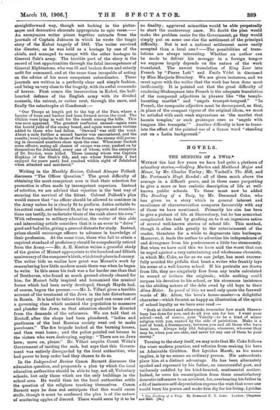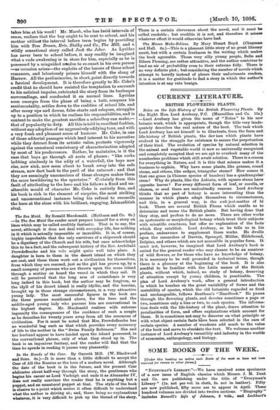NOVELS.
THE BENDING OF A TWIG.* WITHIN the last few years we have had quite a plethora of schoolboy stories,—Godfrey Marten and Maitland Major and Minor, by Mr. Charles Turley ; Mr. Vachell's The Hill, and Mr. Portman's Hugh Bendal : all of them much above the
average in a difficult genre, and in three cases purporting to give a more or less realistic description of life at well- known public schools. To these must now be added The Bending of a Twig, by Mr. Desmond Coke, who has given us a story which in general interest and excellence of characterisation compares favourably with any of those we have mentioned. Primarily his aim has been to give a picture of life at Shrewsbury, but he has somewhat complicated his task by grafting on to it an ingenious satire of several well-known stories of school life. This method,
Ithough it often adds greatly to the entertainment of the reader, threatens for a while to degenerate into burlesque. Moreover, it leads the author to advertise his independence of and divergence from his predecessors a little too strenuously. But when we have said this we have said the worst that can be urged against a very entertaining and wholesome chronicle, in which Mr. Coke, so far as we can judge, has most success- fully avoided the pitfalls that beset a writer who frankly lays his scene at a well-known school. If his portraits are drawn from life, they are singularly free from any traits calculated to wound or irritate the originals ; while nothing could surpass his devotion to his school, or his strenuous insistence on the abiding nature of the debt owed by old boys to their Alma Mater. In proof of this we need only quote the farewell
words of lair. Alton, the hero's house-master—a delightful character—which furnish as happy an illustration of the spirit of school loyalty as we have ever read :—
"Both at Oxford and afterwards, remember how much Shrews- bury has done for you, and do all you can for her. I want your school—and, of course, your 'Varsity—to be a kind of minor religion with you, ranked by the side of patriotism. Make it a sort of bond, a freemasonry, between you and all those who have been here. Always help Old Salopians, wherever, whoever they may be, when you are able, and never let any one of them be your enemy."
Turning to the story itself, we may note that Mr. Coke follows the wiser modern practice, and refrains from making his hero an Admirable Crichton. But Lycidas Marsh, as his name implies, is by no means an ordinary person. His antecedents place him at a distinct advantage. He has been alternately spoiled and repressed by his father, an unsuccessful poet, and
uniformly coddled by his kind-hearted, sentimental mother. Indeed, he owes his emancipation from these unsatisfactory .
d.omestic influences to an accident, for, overhearing his father in a fit of insincere self-depreciation express the wish that some one would burn his poems and make him dig for his living, Lycidas
" The Bending of a Twig. By Desmond F. T. Coke. London Chapman and Hall. [tia..1 takes him at his word ! Mr. Marsh, who has lucid intervals of sense, realises that the boy ought to be sent to school, and his mother utilise S the interval before term begins by providing him with Tom Brown, Eric, Stalky and Co., The Hill, and a wildly sensational story called Jack the joker. As Lycidas has never been to school before, it may readily be imagined what a rude awakening is in Store for him, especially as be is possessed by a misguided retolve to re-enact in his own person —as 'occasion arises—the exploits of the heroes of these school romances, and laboriously primes himself with the slang of Harrow. All the preliminaries, in short, point directly towards a farcical development. It is therefore greatly to Mr. Coke's credit that he should have resisted the temptation to succumb to his satirical impulse, extricated the story from its burlesque surroundings, and conducted it on normal lines. Lycidas soon emerges from the phase of being a butt, conquers his sentimentality, settles down to the realities of school life, and after many ups and downs, false starts and relapses, struggles up to a position in which he realises his responsibilities, and is content to make the greatest sacrifice a schoolboy can make,— that of popularity to duty. All this is told in excellent fashion, without any adoption of an aggressively edifying tone, and with a very fresh and pleasant sense of humour. Mr. Coke, in one of those editorial passages which lend interest to his narrative while they detract from its artistic value, protests vigorously against the unnatural consistency of characterisation adopted by most of his predecessors. Rather, he maintains, is it the case that boys ,o through all sorts of phases : "like corks bobbing aimlessly in the eddy of a waterfall, the boys now rise, now sink, now seem about to break away into the safe stream, now dart back to the peril of the cataract : and that they are seemingly unconscious of these changes makes them the more bewildering to the spectator." CJrtainly from this fault of attributing to the hero and his fellows a fixed and un- alterable mould of character Mr. Coke is entirely free, and his book is rich in the element of surprise, the most striking and unconventional instance being his refusal to reconcile the hero at the close with his brilliant, engaging, Ishmaelitish rivaL











































 Previous page
Previous page